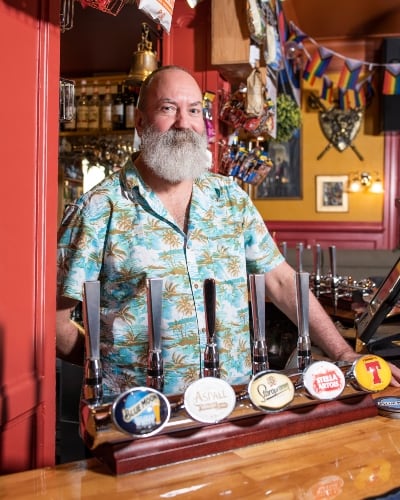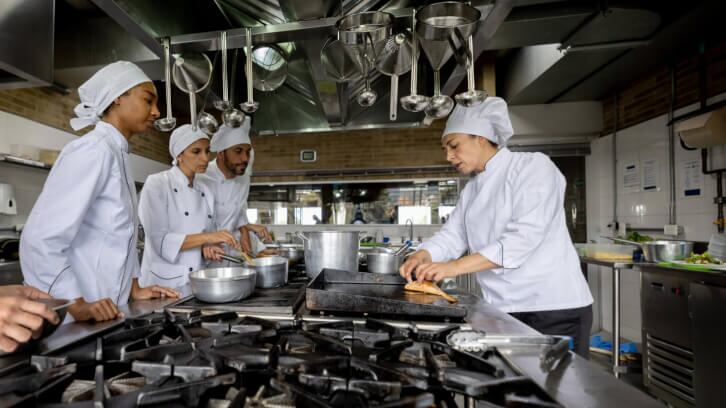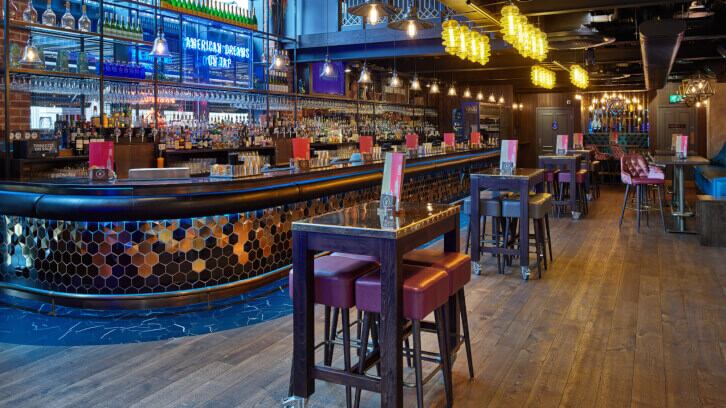A Business Confidence Survey from CGA and Fourth in October 2023 revealed business leaders had increased staff pay by an average of 10% versus the previous year. This had helped to reduce some of vacancies – but at a cost.
Promotional content

Overcome staff shortages with Brigad
If you’ve been struggling to find motivated and qualified staff for your business, it’s time to sign up for Brigad.
Since 2016, we have empowered 10,000 hospitality businesses to easily reinforce their teams with qualified self-employed hospitality professionals when they find themselves lacking support.
Brigad is an app that enables hospitality businesses to directly connect with qualified, hospitality freelancers for flexible work. Simply post the role you need filled with the relevant details. Our algorithm will then send the shift to hospitality freelancers in your area with the necessary skills, and one will accept. 80% of jobs are accepted in less than two hours.
What makes Brigad stand out is the quality of our community. From 150,000 sign ups, only 13% of these pass our rigorous vetting process, meaning that you’ll be working with the best of the best.
In hospitality, time is money! Brigad’s tech is powerful, yet simple to use; shifts can be posted in less than three minutes. Calling in an experienced freelancer who can hit the ground running will also save you precious time. The fact that there are no middlemen involved means that efficiently finding backup if and when you need it, even at the last minute, is possible. Brigad also makes admin and paperwork easy - contracts, invoices and insurance documents are automatically and securely generated and can be easily exported.
Ready to boost your team with the support of qualified, talented hospitality freelancers? Find out more here.
However, 55% of business leaders revealed they were experiencing staff shortages (minus 9 percentage points on the previous quarter) and 8% of job roles were still vacant and open for applications.
Of those leaders surveyed, 43% were concerned or very concerned about the impact of staff shortages on the sector. While still troubling, this is actually down on August 2023 when 91% of hospitality leaders were concerned about staff shortages.
Nicolas Ferrary, GM for the UK at Brigad, the freelance worker app, says job vacancies are higher than pre-Covid.
He says: “This is a combination of fewer candidates applying to new jobs and retention being at its lowest. The staffing shortage has a significant impact for businesses that report operating below full capacity. Some pubs or restaurants even have to reduce opening days or hours.”
As we start 2024, there is no doubt it is an employees’ market. Pub recruitment is a minefield. Pub chains are finding people applying for numerous positions and playing companies off against each other. Some potential staff don’t turn up for interviews and some are even not turning up on their first day of work despite signing contracts of employment.
How are operators able to deal with these challenges? How are they being innovative to tackle the recruitment crisis and how are they retaining and training these staff?
Dynamic environment
Barons Pub Company, the 10-strong operator, was winner of best pub employer (up to 500 sites) at The Publican Awards in 2023.
Charlotte Edwardes, senior manager of People Practice & Development, admits the past three to four years has been a “dynamic environment to navigate”.
“The employee definitely has the power and influence over the jobs at the moment. We have noticed it makes people slightly more entitled as they have the choice to shop around because there are that many available jobs,” says Edwardes.
The pubco recruits via a range of routes including online recruitment, websites, job adverts, word of mouth and on local community boards.
“You have to differentiate your recruitment approach as different ways of recruiting are going to recruit different people,” she says.
The employment of chefs and kitchen teams have been an issue for the sector well before the impact of Brexit and Covid – and remains so – but Edwardes says some senior operational roles have been challenging as well, although this is easing.
Pub location can also have an impact on staffing, especially if the venue is not near good transport links, as some of the Barons estate is.
“People want to give things a go before they make big commitments and because of that I think transport links can impact whether people choose us over other operators,” she adds.
“We do have accommodation at quite a lot of our sites, which is a primary source of attraction, particularly for the kitchen community.”
Many of its sites are community based and are very much focused on attracting the next generation of hospitality professionals, through links with colleges, universities and training providers. They also offer a placement programme where students can stay and work with them until the end of their formal education.
“It really does work. We have had people leave college and say university is not for me and can you offer me something? Because we offer recognised vocational qualifications up to a Level 5, they think it is something of more value,” she says.
“Then we have people finishing university coming to us and asking whether there is a career path they can follow.”
Adding value for workers
Keeping staff motivated and wanting to stay with the company is one of the major challenges moving forward.
“Pay is one thing absolutely but another thing we tap into is that people are productive, happy and enjoy themselves when they find purpose and have meaning to their work,” she says.
Case study

Offer agreed for fewer days at work
Punch licensee Alan Nicholls runs the Regent Bar in Edinburgh and like every publican across the UK, he came out of the constant Covid lockdowns realising he needed to review his business and its staffing.
One of the issues was many workers had been on furlough for 18 months and had spent that time reviewing their life and career options.
“After a couple of months, some people came back and decided they wanted to do something else. This is hard work. When you are in it all the time you don’t realise how much you are doing until it stops,” he says.
The result was that Nicholls had to go back to the drawing board because he decided he needed a different approach.
“I thought ‘how am I going to look after the staff I have now so we are not on this constant treadmill of hiring and losing?’. I had a real think about it and I had a chat to the staff,” Nicholls said.
The result was a collaboration between Nicholls and his staff who came up with a solution for the pub that worked for both the business and the employees. Wages were not really an issue because the pub had always paid the national living wage and had not distinguished between pay rates based on age.
Nicholls looked at the pub’s trading hours and when it was taking the most money. The pub does not serve food and because daytime drinking had dropped off in the wake of Covid, Nicholls decided there needed to be a change in opening hours.
He did not want to cut any staff hours but suggested a four-day week for full-time staff. This means employees work an extra few hours a day but are able to have three days off during the week. Staff were keen on the plan and the business has worked around their preferences of days off.
“We now open mid-afternoon. This means that instead of having a day shift and a night shift, we just have one shift a day now – they come in open the bar and close the bar,” Nicholls says.
“That has worked really positively and means staff have proper breaks between working in the pub.”
The new working and opening hours have benefited trading and has helped to retain staff.
“Look after your team and they will take care of you,” says Nicholls.
The company has focused on what value it can add for staff, including training through its Barons Training Academy. One new initiative the company has launched is a benefits package called the employee and experiences calendar. It offers a range of sociable events, which are proving popular with employees, many of whom are being careful with their money during the cost-of-living crisis.
“We invite our teams on all sorts of community, learning and development events so things like brewery visits and distillery tours. We even have an ‘inter-pub rounders’ event, which brings in staff’s families and we put some food on afterwards,” she says.
The pubco has embraced flexible working that supports parents who want to work evenings or those retired that want to have a few shifts. It has been trialled and a four-day week has been offered to help with work-life balance, especially among its kitchen teams.
“It is about what we provide that stands us out even more so than other companies,” she adds.
Fuller’s, the pub operator, also focuses on recruiting new people and developing from within the business. In the wake of the Covid pandemic, it also saw a shift in the type of staff and people wanting to work in the sector.
“One of things we have started to do is to think about the right type of people,” says Fuller’s People & Talent director Dawn Browne. “Our ethos is very much to recruit for personality and train for skill.”
One the of things Fuller’s noticed when coming out of the pandemic was the number of workers aged 50 and older had decreased within the business and it was keen to rebalance that.
“We found the fastest growing area of our workforce was 16 and 17-year-olds rather than the older generation. The challenge with the community of 16 to 17-year-olds is their lack of experience in hospitality and in life. Hospitality is all about connection and conversation,” Browne highlights.
“We set out to rebalance the books in terms of recruiting some of those really valuable people with life experience who were maybe looking for a different career.”
The new recruitment drive has proved a success because, not only does it match staff to the customer demographic of many of its pubs within the business, it also helps to rebalance the teams.
“They love the flexibility that hospitality provides. It could be because they are caring for younger children or older parents or they just have a life and hobbies,” Browne says.
“They want a job that fits round them. It is also a very social job. For some of our older workers – our oldest team member is 90 years old – they may live on their own and it has a social role.”
The company has been lucky to offset some of the recruitment challenges by the fact it has an ethos of growing its own. It has development programmes to help turn kitchen assistants into head chefs and an apprenticeship programme, including one that focuses on chefs.
Retention is a major focus for the business and creating a culture and offering training is core. The approach is working as the company has completed the third year of its staff engagement survey, which has had the best results so far in terms of staff satisfaction.
“The biggest challenge for us is the cost of people – with minimum wage going up 10%, the knock-on effect of the cost of people is challenging. We are not a retailer, we can’t just say everybody must check out their own shopping because we are delivering an experience,” she says.
“It feels like the recruitment challenge is easing slightly but I don’t see a light at the end of the tunnel with the chef challenge.”
Chefs from India
Thwaites, based in the north-west of England, agrees chefs and kitchen roles remain difficult.
One innovative approach to the chef recruitment crisis has been to recruit for these roles from abroad.
“We have taken 18 chefs from India who have been fantastic and have really worked out well,” says Jason Royal, Thwaites people & development director.
But the recent announcement by the Government that the salary levels for these sponsored jobs will increase has put this policy under pressure.
Thwaites is also working with women’s prisons and has had some success in Yorkshire area where it has had people on placement who are on release on temporary licence.
“We have success and have one or two that have gone into our kitchens and they have been amazing. It has worked and they are being well-trained within prisons,” he says.
Location is proving a challenge for the business because it has many sites in more rural areas such as the Lake District.
It has taken a new approach to the situation that has seen it face issues with recruitment not just a pub level but also with housekeeping roles, many of which were filled by European workers who no longer want to work in them or cannot be sponsored in the UK.
It is offering staff accommodation and live-out allowances. There are also transport payments as well as a staff travel offer, where a member of staff is insured to drive staff locally.
The company also reviews pay to make sure it is in line with market rates and has launched a benefits system called Wage Stream, which is proving very popular. It allows staff to draw down a certain amount of their earnings anytime they want to help with cash flow and offers discounts on high street brands.
“People are actively seeing employment with companies that offer that. We have seen really good take-up,” Royal says.
The increase in demand is for work-life balance is an area in which Thwaites has spearheaded change.
“In certain roles in our industry we are quite ‘prehistoric’,” Royal admits.
“If you talk to some chefs who have been around for a long time, they want someone to come in and do a 7am until 3pm or 3pm to 11pm. But we have had to help them understand that is not where the job market is anymore post-Covid.”
Giving staff a chance to communicate their concerns through an initiative called Employer Voice has also become an important tool in helping to retain staff.
“We are quite innovative and think outside the box but I am worried for some smaller businesses as they are going to struggle,” he admits.
For lessees and tenants, the situation remains difficult because they don’t have the support of HR and recruitment departments. Star Pubs & Bars has been supporting its licensees with a range of initiatives from advising them to consider multi-skilling their teams and deskilling the kitchen to offering support through temporary job cover.
“As well as pubs working with their existing staff, it’s important to look beyond a reliance on recruiting school and college leavers. Only 10% of the workforce in hospitality is made up of people over 50,” says Tracy Bickerdike, head of training at Star Pubs & Bars.
Whatever the situation, staffing is likely to remain a challenge for the industry moving forward. Pub companies and licensees are being innovative and forward thinking in offering good career prospects and benefits to retain staff. Innovation is driving some real positive results.




